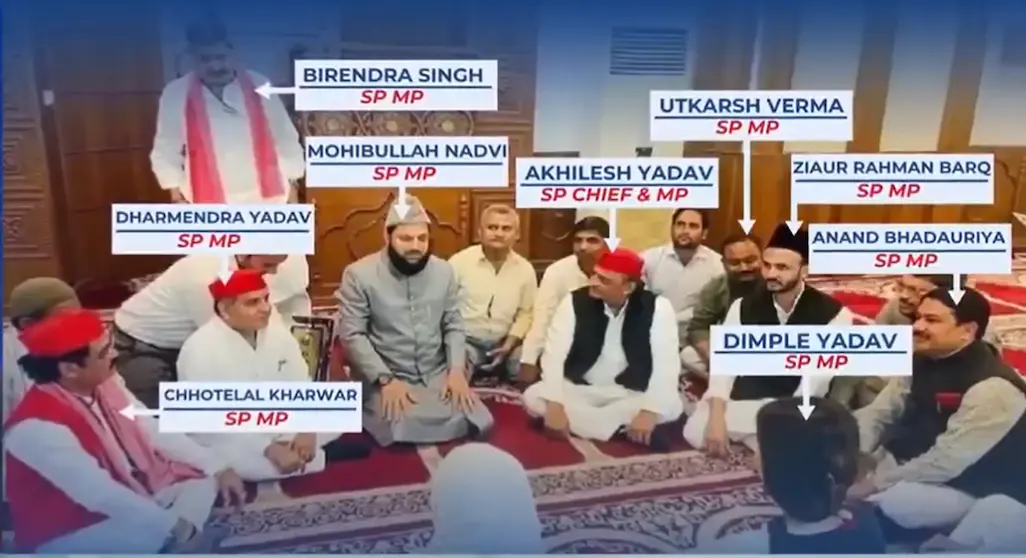
SP claims it was a personal visit; BJP alleges it was political.(photo source- CNN News18)
Context: What Sparked the Controversy?
Akhilesh Yadav Mosque Visit – On July 23, 2025, photos surfaced showing Akhilesh Yadav, his wife Dimple Yadav, and other Samajwadi Party MPs seated inside a mosque near Parliament. While SP leaders claimed it was a casual visit at the invitation of Imam Mohibbullah Nadvi, BJP leaders alleged it was a political meeting held in a religious space.
Table of Contents
The incident quickly escalated into a national debate, with accusations of pseudo-secularism, religious tokenism, and constitutional impropriety flying across party lines.
Secularism in India: A One-Way Street?
Political commentator Anand Ranganathan criticized the visit, stating:
“Samajwadi is Hinduphobic & Pseudo Secular… Secularism is a one-way street where only Hindus walk, the rest have their own way.”
His remarks reflect a growing sentiment among some commentators that secularism in India is selectively applied, often scrutinizing Hindu leaders for religious engagements while overlooking similar actions by others.
The Constitutional Debate: Can a CM Take a Dip?
The controversy also revived an earlier debate around Yogi Adityanath’s participation in the Kumbh Mela. Ranganathan argued:
“Yogi Adityanath is in a constitutional post, he is the CM. He can’t take a dip in the Kumbh.”
In contrast, Ishkaran Bhandari, a legal expert, countered:
“There is nothing in the Constitution that bars it.”
This clash underscores the ambiguity in constitutional interpretation regarding religious participation by public officials. While the Constitution mandates secular governance, it does not explicitly prohibit personal religious observance.
BJP’s Reaction: Political Optics or Genuine Concern?
BJP leaders, including Jamal Siddiqui and Mukhtar Abbas Naqvi, condemned the mosque visit as a betrayal of secularism. They argued that:
- Political meetings should not be held in religious places
- The visit was a deliberate attempt to polarize voters
- Dimple Yadav’s attire allegedly violated mosque decorum
Some BJP leaders even threatened to hold counter-meetings in mosques, starting with the National Song and ending with the National Anthem, to highlight what they called double standards.
SP’s Defense: Faith and Unity
Akhilesh Yadav responded by saying:
“Faith connects people, regardless of religion. That’s exactly what troubles the BJP – they don’t want unity, they want distance to remain.”
Dimple Yadav dismissed the allegations, stating:
“Imam Nadvi ji, who is our MP, had invited us. BJP is spreading misinformation.”
SP leaders accused the BJP of diverting attention from real issues, such as the Pahalgam attack, Operation Sindoor, and economic concerns.
Media and Public Response
The incident dominated headlines and social media, with hashtags like #MosquePolitics, #SecularismDebate, and #AkhileshControversy trending nationwide.
Public opinion was sharply divided:
- Supporters viewed the visit as a personal act of faith
- Critics saw it as political opportunism
- Neutral observers called for clearer guidelines on religion in public life
The Larger Question: What Is Indian Secularism?
India’s secularism is not atheistic, but pluralistic, allowing all religions to coexist. However, the State is expected to remain neutral in religious matters.
Yet, political parties often:
- Attend religious festivals
- Seek blessings from spiritual leaders
- Use religious symbolism in campaigns
This raises the question: Is secularism being practiced or merely performed?
Timeline of Events
| Date | Event |
| July 23, 2025 | Akhilesh Yadav visits mosque near Parliament |
| July 24, 2025 | BJP leaders condemn the visit |
| July 25, 2025 | SP defends the visit, calls it personal |
| Ongoing | Public debate on secularism and double standards |
Conclusion: A Moment of Reflection for Indian Democracy
Akhilesh Yadav mosque visit has become more than a photo-op, it’s a mirror reflecting India’s complex relationship with secularism. As political parties continue to navigate faith and governance, the need for consistency, transparency, and constitutional clarity becomes ever more urgent.
Whether one sees the incident as a symbol of unity or a strategic misstep, it undeniably forces us to ask: Is secularism in India truly equal for all?
Was Akhilesh Yadav’s mosque visit a political meeting?
SP claims it was a personal visit; BJP alleges it was political. No formal agenda was released.
Is it unconstitutional for politicians to visit religious places?
No. The Constitution does not bar personal religious observance, but discourages mixing religion with official duties.
Why is Yogi Adityanath’s Kumbh participation controversial?
Critics argue that as CM, his religious participation blurs the line between State and religion. Supporters say it’s a personal right.
What is pseudo-secularism?
A term used to describe selective secularism, where criticism is disproportionately directed at one religion.
Stay updated with the latest news on Rapido Updates. Keep yourself updated with The World, India News, Entertainment, Market, Automobile, Gadgets, Sports, and many more